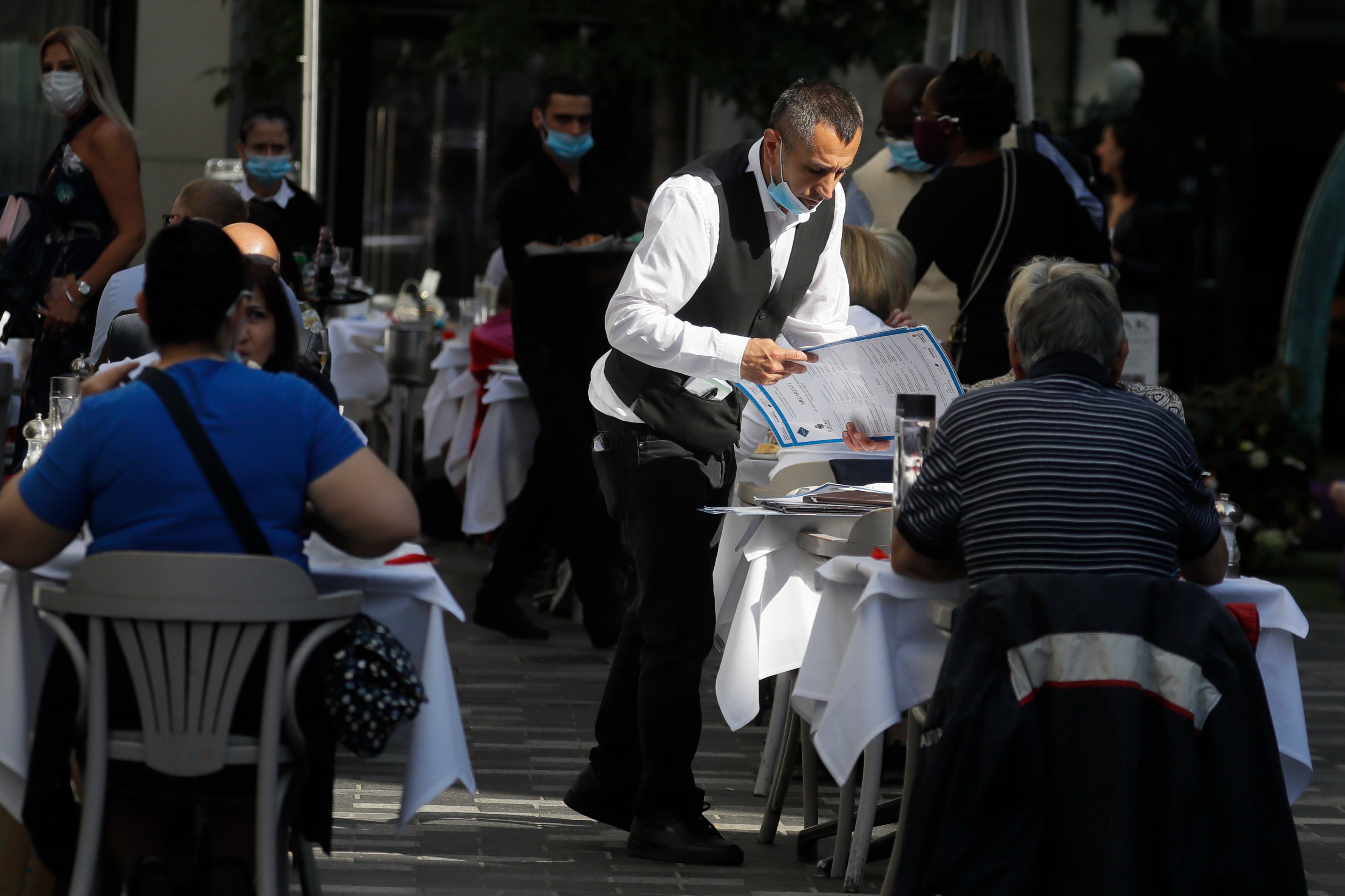UK to impose tougher COVID-19 measures amid case spike
British Prime Minister Boris Johnson is planning to announce new restrictions on social interaction as the government tries to slow the spread of COVID-19 before it spirals out of control

Your support helps us to tell the story
From reproductive rights to climate change to Big Tech, The Independent is on the ground when the story is developing. Whether it's investigating the financials of Elon Musk's pro-Trump PAC or producing our latest documentary, 'The A Word', which shines a light on the American women fighting for reproductive rights, we know how important it is to parse out the facts from the messaging.
At such a critical moment in US history, we need reporters on the ground. Your donation allows us to keep sending journalists to speak to both sides of the story.
The Independent is trusted by Americans across the entire political spectrum. And unlike many other quality news outlets, we choose not to lock Americans out of our reporting and analysis with paywalls. We believe quality journalism should be available to everyone, paid for by those who can afford it.
Your support makes all the difference.British Prime Minister Boris Johnson plans to announce new restrictions on social interactions Tuesday as the government tries to slow the spread of COVID-19 before it spirals out of control.
Cabinet Office Minister Michael Gove told Sky News that pubs and restaurants across England will be ordered to close at 10 p.m. and people who can work from home will be encouraged to do so, reversing a government drive to get people back to their offices and other places of employment.
Gove said reducing “social mixing” was key to slowing the spread of the virus. He said it was impossible to say how long the restrictions would be in place.
“What we hope is we can take appropriate steps now, which mean that if we succeed in beating back the virus, then we will in the future be able to progressively relax them,” Gove told the BBC. “But what I can’t do is predict with absolute certainty.”
The prime minister is set to release further details when he speaks to the House of Commons at around 12:30 p.m. (1130 GMT) after meeting the Cabinet and the government's COBRA emergency committee. He will later deliver a televised address to the nation.
Plans to have spectators return to sports stadiums are also likely to be put on hold as part of the new restrictions.
The news comes a day after the British government’s top scientific and medical advisers said coronavirus infections were doubling every seven days and could rise to 49,000 a day by mid-October if nothing is done to stem the tide. On Monday, the government reported 4,300 new confirmed cases, the highest number since May.
The U.K. has gradually been increasing restrictions as cases rise, including barring people from meeting in large groups. But the measures are likely to be far less stringent than a nationwide lockdown imposed in March that confined most of the population and closed most businesses. The lockdown was eased starting in June as cases began to fall, but that trend has now been reversed.
Some lawmakers from the governing Conservative Party are uneasy about the move to tighten restrictions on business and daily life, citing the impact on an already-reeling economy and the curbing of civil liberties.
Employers and workers in hospitality businesses are also concerned.
Kate Nicholls, chief executive of trade body UKHospitality said the planned restrictions were “another crushing blow” for many businesses.
But most epidemiologists believe restrictions are again necessary.
The chief medical officers of England, Scotland, Wales and Northern Ireland on Monday raised the U.K.'s virus alert from three to four, the second-highest level, on the advice of the Joint Biosecurity Center. They said cases of COVID-19 were rising “rapidly and probably exponentially.”
In a live televised briefing, Chief Scientific Officer Patrick Vallance and Chief Medical Officer Chris Whitty said after new confirmed cases increasing slowly over the summer, the number is now doubling every seven days.
In other countries, such an increase has soon led to a rise in deaths, Whitty said.
Whitty stressed that infection rates are rising among all age groups, and infections among the young and healthy will inevitably spread to friends, family and ultimately to the most vulnerable in society.
“This is not someone else’s problem,” he said. “This is all of our problem.’’
While death rates remain relatively low so far, Whitty warned that deaths are likely to rise. The U.K. reported a seven-day average of 21 deaths a day last week, compared with a peak of 942 deaths on April 10.
To persuade people to stay home if they test positive, the government announced it would pay low-income workers 500 pounds ($639) if they are told to self-isolate for 14 days. It also said those breaking quarantines could face fines up to 10,000 pounds ($12,800).
Britain has Europe’s highest death toll in the pandemic, with over 41,800 deaths, according to a tally by Johns Hopkins University. Experts say all such figures understate the true impact of the pandemic.
The rise in U.K. infection rates comes as lawmakers across the political spectrum have criticized the Conservative government’s testing program. While ministers tout the record numbers of tests being performed, there are widespread reports of people having to travel hundreds of miles for tests or tests being voided because it’s taking labs too long to process them.
An app meant to bolster virus contact tracing efforts is to be released this week after months of delay.
___
Follow AP’s pandemic coverage at http://apnews.com/VirusOutbreak and https://apnews.com/UnderstandingtheOutbreak